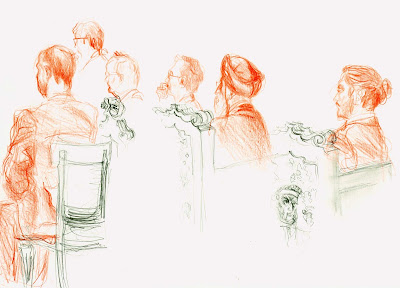There was much chortling in-jokery last week about Lord Sumption’s ties at the four-day Article 50 hearing. Today, Jeeves has clearly returned from his holiday but there are no fervid rune-readers here to report that Lord Sumption is wearing an EU-blue tie with what could from a distance be gold stars on it. They are probably polka dots.
Today’s case is about contract and trusts. It refers to planning
permission. Meanwhile the court has a planning application notice outside, as it
is seeking to replace an oak floor which has a romantic creak like a ship in
full sail. I hope the sound gets archived before the timbers are shivered.
BPE Solicitors and
another v Hughes-Holland (in substitution for Gabriel) is the latest in a
strand of litigation stemming from a discussion in ‘the Red Hart public house’ in 2007 between two friends: Richard Gabriel is the
godfather of one of Peter Little’s children. Mr Gabriel agreed to lend Mr
Little’s company £200,000 towards developing a property at Kemble Airfield
(Cotswold Airport), formerly the base of the Red Arrows.
I google Cotswold Airport. In its AV8 restaurant ‘you will
be able to watch the world fly by in a classy atmosphere with a distinctly
Mediterranean feel, something that you do not come across very often in the UK.' I guess that's why I voted Remain.
The property was not developed, the loan was not repaid. Mr Gabriel chose, as counsel puts it today, 'to roll the dice of litigation’.
Can he recover from his solicitors the money he lost, and did they have a duty to
protect him from the loss? Are Dickens and Kafka playing consequences?
At lunchtime, the Treasury Singers arrive for their annual charity
carol concert, this year for Crisis.
We are ushered into the lofty anarcho-gothic-pre-Raphaelite library (normally off-limits), which has been camped up with pine garlands and poinsettias. Justices pop in. The Supreme Court’s misdescribed Can’t Sing Choir join in with relish and don Santa hats for the finale, We Wish You a Merry Christmas. There is an earnest endeavour that touches the flinty heart.
I go to the café where my friend does some quick and easy Christmas shopping, including a teddy bear for a baby.
We are ushered into the lofty anarcho-gothic-pre-Raphaelite library (normally off-limits), which has been camped up with pine garlands and poinsettias. Justices pop in. The Supreme Court’s misdescribed Can’t Sing Choir join in with relish and don Santa hats for the finale, We Wish You a Merry Christmas. There is an earnest endeavour that touches the flinty heart.
I go to the café where my friend does some quick and easy Christmas shopping, including a teddy bear for a baby.

































